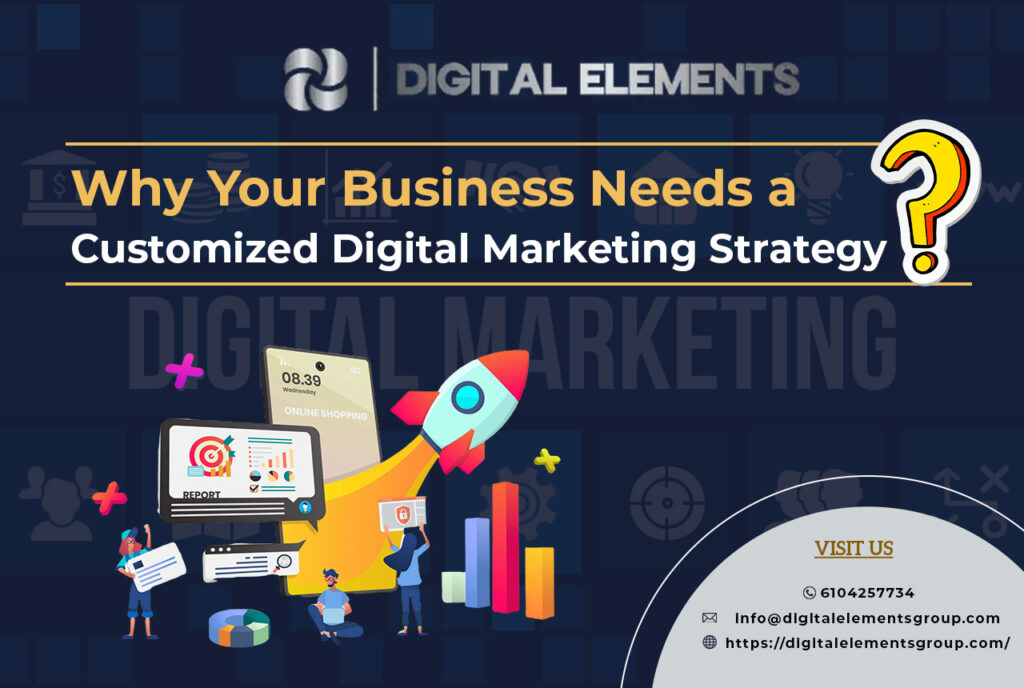
today’s hyper-connected world, digital marketing is not just an option—it’s a necessity. Businesses of all sizes, from small startups to global enterprises, rely on digital channels to engage with their audience, build brand awareness, and drive sales. But the question is not whether you need digital marketing—it’s how you can make it work best for your business. This is where a customized digital marketing strategy comes into play.
The Importance of Digital Marketing
Digital marketing encompasses a variety of strategies, including social media, email marketing, content creation, search engine optimization service, pay-per-click (PPC) advertising, and more. These channels provide businesses with the tools to reach their target audience efficiently and effectively. However, the ever-growing complexity of the digital landscape means a one-size-fits-all approach no longer works. Each business is unique, and your digital marketing strategy should reflect your specific goals, audience, and industry challenges.
What Is a Customized Digital Marketing Strategy?
A customized digital marketing strategy is a tailored plan that aligns with your business’s objectives, target audience, and resources. Unlike generic marketing strategies, it takes into account the nuances of your industry, competitive landscape, and customer preferences. This personalized approach ensures that every effort contributes directly to achieving your goals.
Benefits of a Customized Digital Marketing Strategy
1. Better Alignment with Business Goals
A customized strategy focuses on your specific objectives, whether it’s increasing brand awareness, generating leads, boosting sales, or enhancing customer retention. By aligning your marketing efforts with your business goals, you ensure that every campaign delivers measurable results.
2. Improved Audience Targeting
Not all audiences are the same. A personalized strategy allows you to define your ideal customer profile and create targeted campaigns that resonate with your audience. With tools like data analytics and market research, you can gain insights into customer behavior, preferences, and pain points, enabling you to craft messages that speak directly to them.
3. Efficient Resource Allocation
A tailored strategy helps you allocate your marketing budget and resources more effectively. Instead of spreading your efforts thin across multiple channels, you can focus on the platforms that yield the highest return on investment (ROI). This ensures that every dollar spent contributes to achieving your goals.
4. Competitive Advantage
In a crowded marketplace, standing out is crucial. A customized digital marketing strategy helps you differentiate your brand by leveraging your unique value proposition. Whether it’s through innovative content, personalized email campaigns, or targeted ads, you can create a strong presence that sets you apart from competitors.
5. Scalability and Adaptability
A personalized strategy is inherently flexible, allowing you to adapt to changing market trends, customer needs, and technological advancements. This scalability ensures your marketing efforts remain effective as your business grows and evolves.
Key Components of a Customized Digital Marketing Strategy
To create a successful tailored strategy, you need to consider several critical elements:
1. Clear Goals and Objectives
Start by defining what you want to achieve. Your goals should be specific, measurable, achievable, relevant, and time-bound (SMART). Whether it’s driving website traffic, increasing social media engagement, or boosting e-commerce sales, having clear objectives guides your strategy.
2. In-Depth Audience Analysis
Understanding your audience is the foundation of any successful marketing strategy. Use tools like Google Analytics, social media insights, and customer surveys to gather data on demographics, interests, and online behavior. This information will help you create buyer personas and craft targeted campaigns.
3. Comprehensive Competitor Research
Analyze your competitors’ digital marketing efforts to identify opportunities and gaps in the market. Look at their social media presence, content strategy, SEO performance, and advertising campaigns. This research provides valuable insights into what works and what doesn’t in your industry.
4. Channel Selection
Not all channels will be relevant to your business. Choose platforms that align with your audience’s preferences and your marketing goals. For example, if your target audience is professionals, LinkedIn may be more effective than Instagram. Similarly, if you’re targeting younger audiences, platforms like TikTok might be a better fit.
5. Content Strategy
Content is the cornerstone of digital marketing. Develop a content plan that includes blog posts, videos, infographics, and social media updates tailored to your audience’s interests. High-quality, engaging content not only attracts and retains customers but also boosts your SEO efforts.
6. SEO and SEM
Search engine optimization (SEO) and search engine marketing (SEM) are critical for driving organic and paid traffic to your website. Optimize your website for relevant keywords, improve site speed, and create valuable content that ranks high on search engines. Complement your SEO efforts with targeted PPC campaigns to achieve immediate visibility.
7. Data-Driven Decision Making
Use analytics tools to track the performance of your campaigns and measure ROI. Regularly monitor metrics like website traffic, conversion rates, click-through rates, and social media engagement. This data helps you identify what’s working and where adjustments are needed.
8. Personalization
Personalization is no longer optional—it’s expected. Tailor your messages, offers, and experiences to individual customers based on their preferences and behavior. This enhances customer satisfaction and drives loyalty.
9. Ongoing Testing and Optimization
Digital marketing is not a set-it-and-forget-it endeavor. Continuously test different strategies, such as A/B testing for email campaigns or ad variations. Use the insights gained to refine your approach and maximize results.
Real-World Examples of Customized Digital Marketing Strategies
1. Airbnb
Airbnb’s digital marketing strategy focuses on personalized user experiences. By analyzing user data, the company recommends unique travel destinations and accommodations based on individual preferences. Their targeted social media campaigns and user-generated content further enhance engagement and brand loyalty.
2. Nike
Nike excels at leveraging digital channels to connect with its audience. Their campaigns, like the “Just Do It” series, combine emotional storytelling with cutting-edge technology. Personalized emails, social media ads, and influencer collaborations ensure they stay relevant to their diverse customer base.
3. Amazon
Amazon’s success is built on its ability to deliver highly personalized experiences. From product recommendations to targeted ads, the company uses data-driven strategies to cater to individual customer needs, resulting in higher conversion rates and customer satisfaction.
A customized digital marketing strategy is essential for businesses looking to thrive in today’s competitive landscape. By aligning your efforts with your specific goals and audience, you can achieve better results, maximize ROI, and stay ahead of the competition. Whether you’re a small business or a large corporation, investing in a tailored approach ensures your marketing efforts drive meaningful outcomes. Start building your customized digital marketing strategy today and watch your business reach new heights.



